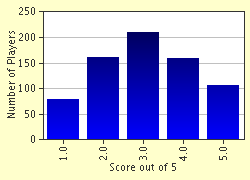Quiz Answer Key and Fun Facts
1. For atoms that contain more than one electron, the Pauli Exclusion Principle states that:
2. Which of the following compounds DOES NOT obey the octet rule?
3. According to Boyle's Law, if the volume of a gas decreases, its pressure will: (assuming temperature is constant)
4. Which of the following is one of the major components of acid rain?
5. Which of the following is NOT classified as a Bronsted-Lowry base?
Source: Author
boredatwork
This quiz was reviewed by FunTrivia editor
crisw before going online.
Any errors found in FunTrivia content are routinely corrected through our feedback system.

